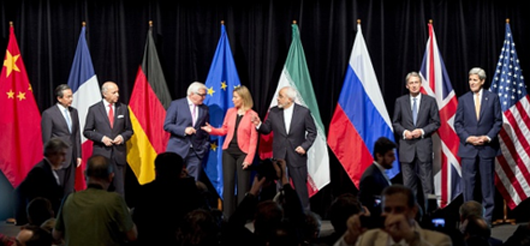New Delhi, Jul 15: Anticipating an end to sanctions against Iran, India, which had reduced its oil imports from Tehran under western pressure, stepped up its oil imports from the Gulf nation from April this year, upping it by over 50% from the same period last year.

It was an early signal to Tehran that while India resisted the sanctions, it plans to enter Iran in a big way. Welcoming the deal, the foreign ministry said, "India's always maintained the issue should be resolved peacefully through dialogue by respecting Iran's right to peaceful uses of nuclear energy ... international community's interest in the exclusively peaceful nature of Iran's nuclear programme."
US secretary of state John Kerry said the deal "shuts off four principal pathways to a bomb for Iran" — the uranium facilities at Natanz and Fordow, Arak plutonium facility and covert attempts to produce fi ssile material. The deal's rewritten rules of geopolitics in West Asia and the Gulf.
India will have to be more nimble to be a genuine player. Whatever its Arab neighbours may say, Iran will emerge as the region's dominant power now.
Reports suggest the sanctions relief could allow Iran to bring home over $100 billion in oil revenues. India's held a delicate balance on Iran as the West, particularly US, turned the screws on Tehran over its nuclear programme. India voted against Iran in the IAEA many times but opposed non-UN sanctions, though that complicated its payment system for Iranian oil.
Iran was a big stick the US used to beat India with. During negotiations on India's nuclear deal with the US, Iran even found mention in the deal's fi nal text. The view from New Delhi, therefore, is wholly welcoming. "It is ultimately in India's interest," said an official source.
From early this year, India's stepped up its highlevel engagement — NSA Ajit Doval visited Tehran, followed by union minister Nitin Gadkari and then foreign secretary S Jaishankar. Last week, PM Modi held his first meeting with Iran's President Rouhani in Ufa, on the SCO summit's sidelines. Foreign minister Sushma Swaraj had announced she'd be travelling to Iran.
This could be a precursor to a summit-level interaction.
The Chabahar port, India's showpiece connectivity project in Iran, formed a significant part of Modi's conversation with Rouhani last week. Iran can now be part of the Afghanistan stabilization story. In the past decade, Tehran has, on occasion, flirted with the Taliban, citing common enemy US. The US is no longer enemy but Islamic State is the new common enemy, also for the Taliban.
As the frontline state that's battling the Islamic State (ISIS), it's not difficult to see where New Delhi, and Washington, will engage Tehran. But India's return to Iran won't be easy.
First, though former PM Manmohan Singh travelled there for a NAM summit in 2012, in reality engagement with Iran came down while India enhanced ties with Iran's rivals Saudi Arabia and Israel. Having balanced Iran and US all these years, New Delhi will now balance its relations with Tehran and Tel Aviv, and Tehran and Riyadh. Second, China's a bigger player; Beijing's pushed a high-speed rail project from Tehran to Isfahan and development of the Chabahar port on a scale and speed India will fi nd impossible to match. Third, India has way fewer citizens working in Iran than it does in the Gulf emirates and Saudi Arabia.





Comments
Add new comment